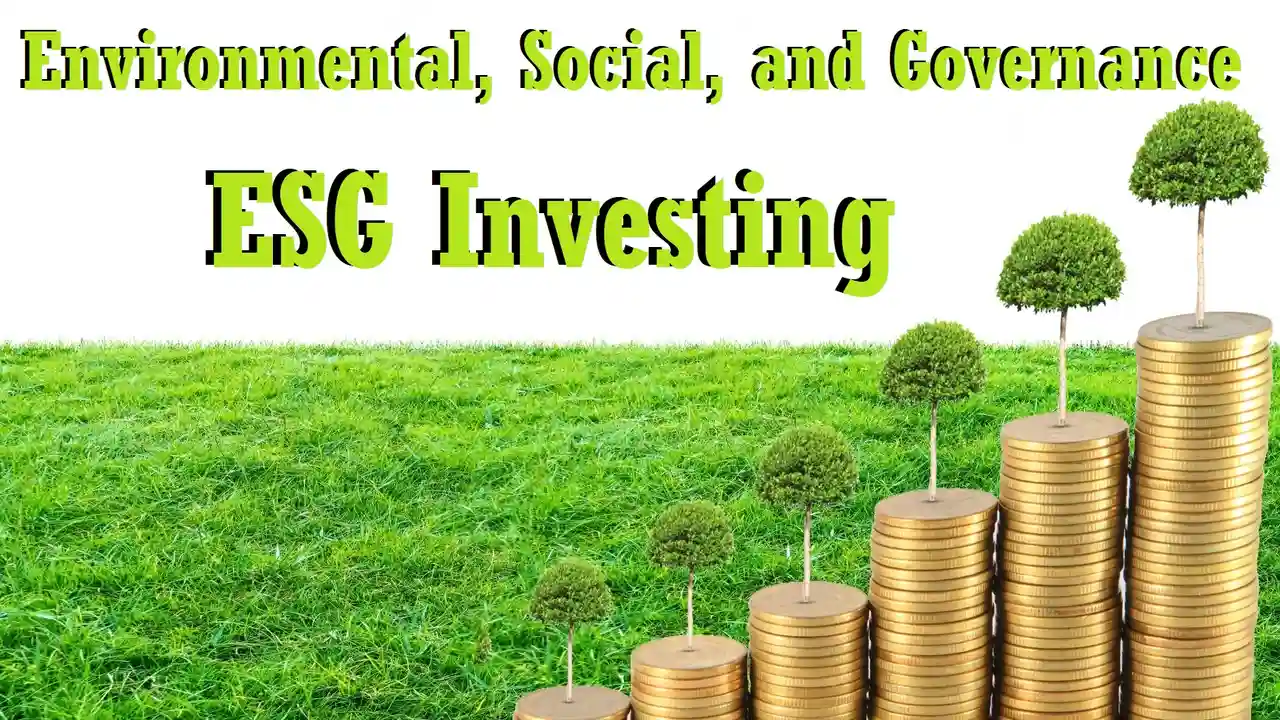Our clients pay us to promote their goods. This may have an impact on what we write and where it appears. Nonetheless, we continue to evaluate. We have distinct points of view. The following is a list of meaning of ESG investing with examples, benefits, limitations, advantages and types of ESG.
You might be interested in knowing what is an investment banker? as well along with this topic for more knowledge purpose. The term “sustainable” is use in numerous contexts. This is change by ESG investing. ESG (Environmental, Social, and Governance) investing examines assets based on specific criteria that define “sustainable.”
Meaning of ESG
Environmental, social, and governance (ESG) criteria are use by socially conscious investors to choose whether to invest in a firm. Environmental criteria assess a company’s environmental practises, such as its policies on climate change.
Social criteria assess a company’s treatment of its employees, suppliers, customers, and communities. Governance encompasses a company’s governance, compensation of its leaders, audits, internal controls, and shareholder rights.
The acronym ESG stands for environmental, social, and governance. These are additional criteria that investors evaluate while assessing a company or investment.
Environmental factors examine how successfully the natural environment is care for. While social aspects examine; how a corporation treats its employees and governance issues examine how a company is administered.
How ESG Criteria Work?
In recent years, investors have demonstrated a preference for values-based investing. ETFs and other ESG-based financial solutions are now available through brokers and mutual fund firms. ESG-based robo-advisors such as Betterment and Wealthfront are available to younger investors.
ESG criteria are also being use by large institutional investors, such as public pension funds, to make investment decisions. At the end of 2019, investors had $17.1 trillion in ESG-selected assets, up from $12 trillion two years earlier.
ESG is synonymous with socially responsible, impact, and sustainable investing (SRI). Investors assess a company’s ESG policies and practises. The proportion of 2020 poll respondents who are interest in ESG investments. ESG factors were used by 19% of investors.
Examples of Best ESG Funds for Investing
ESG investors seek more than just performance in their investments, therefore the “best” fund for one person’s portfolio may be different from the “best” fund for another’s. A wind-only fund may not benefit an investor who currently owns a large number of wind energy companies. Instead, look for funds that are a good fit for your goals and portfolio. Our selection of ESG funds may assist you in locating suitable funds.
This list includes the following: 1919 An all-around socialite (SSIAX) Institutional Fund Pax (PXLIX) Better World International I Thornburg (TBWIX) controls the fundamental equity of Parnassus (PRBLX) iShares MSCI USA ATF SelectESG is an investment fund (SUSA)
Types of ESG Investing
In addition to profitability and global effect, ESG investing evaluates how an investment affects the environment, society, and governance. The ESG score of an investment analyses its sustainability in the aforementioned areas. ESG investors seek to invest in companies that demonstrate strong corporate citizenship, environmental responsibility, and responsible management.
Environmental
Environmental factors include business climate, energy use, waste, pollution, natural resource conservation, and animal treatment. The criteria can also be use to evaluate an organization’s environmental risks and responses. Consider greenhouse gas emissions, toxic waste management, and environmental regulations.
Humans are causing global warming, according to the UN Intergovernmental Panel on Climate Change, and some climate shifts will last hundreds of years. “This report must spell the end of coal and fossil fuels,” UN Secretary-General António Guterres stated.
Social
Social criteria look at how a company treats its stakeholders. Is ESG compliance require of vendors? Does the company donate profits or encourage volunteers? Do people’s jobs show a concern for health and safety? Or does the business treat its customers unethically?
Tesla was remove from the S&P 500 ESG on May 18, according to S&P Dow Jones Indices. Tesla’s departure was mention as a result of its “lack of a low-carbon plan”, business ethics, and how the corporation handled racism, terrible working conditions, and autopilot accidents.
Governance
ESG governance principles ensure that a company’s accounting is honest and clear, that it seeks leaders with integrity and diversity, and that it is accountable to its shareholders.
ESG investors may want to know that firms do not appoint conflicted board members and senior executives, bribe politicians, or engage in illegal activities.
Benefits and Limitations of the ESG Investing
Previously, investors who avoid certain businesses for reasons other than money were regard to be acting against their own best interests. Tobacco and defence, two industries that ESG investors avoid, have outperformed the market.
According to some, ESG criteria could help investors avoid disasters when dangerous or unethical enterprises are held accountable. BP’s 2010 oil spill in the Gulf of Mexico and Volkswagen’s emissions scandal both shook their stock prices and cost them billions of dollars.
As ESG business practises grow more prominent, investment firms are tracking them more frequently. ESG strategy and yearly reports are available from JPMorgan Chase (JPM), Wells Fargo (WFC), and Goldman Sachs (GS).
ESG rules will be useful if they encourage corporations to make significant improvements rather than simply checking boxes and issuing reports. This will be determine by whether investment flows adhere to actual, measurable, and achievable ESG norms.
Advantages of ESG (Environmental, Social, and Governance)
ESG has boundaries, particularly when contrasted to “ethical investment” or “socially responsible investing,” but it does not align with all of your principles. Determine whether “ESG” covers your most important values. ESG is more than just a method for investing sustainably.
Profitability on ESG Investing
According to the Morgan Stanley Institute for Sustainable Investing, sustainable mutual and exchange-traded funds outperformed traditional funds in terms of overall returns. According to certain studies, ESG investments can outperform traditional ones.
JUST Capital examines how firms treat their employees and the environment. It was include in the JUST U.S. Large Cap Diversified Index (JULCD), which covers the top 50% of Russell 1000 companies. The index’s annualised return is 15.94%, whereas the Russell 1000’s is 14.76%.
ESG Investing is Risk-free
According to Morgan Stanley, sustainable funds offer lower downside risk across all asset classes. In an uncertain market, traditional funds were more likely to lose money than sustainable funds. As a result, traditional funds were riskier.
ESG vs. Socially Responsible Investing vs. CSR
SRI is a portfolio of assets that are ecologically sustainable. Both SRI and ESG attempt to build responsible portfolios, but there are differences.
Environmental, Social, and Governance (ESG) examines the sustainability of a company or investment in three ways: the environment, society, and management. Impact investing, SRI, EI, and SRI are more general terms. ESG metrics are use to rate socially responsible investments.
Historically, sustainable investing portfolios were construct differently. SRI banned assets that some regarded unethical, such as cigarettes and alcohol. ESG investing did not include the investments mentioned above, but it did include decent companies.
As the popularity of sustainable investing develops, these and other terms are becoming interchangeable. ESG funds, not just specific assets, are include in “socially responsible” portfolios. Certain assets are exclude from “socially responsible” portfolios. It’s critical to understand how a portfolio, whatever it’s called, is put together.
CSR serves the local community, the environment, or the entire society. CSR actions can help a company’s image and mission. ESG factors may be consider by CSR strategists.
How is ESG calculated?
ESG scores are not standardize because they are calculate differently by different companies. Most suppliers give ESG indicators such as climate change and political contributions, however these vary per source.
There are various methods for gathering information. Moreover, MSCI ESG Research gathers data from company reports, government databases, university databases, and non-governmental organisation databases. The Dow Jones Sustainability Index distributes a customised questionnaire to businesses.
Conclusion
It is simple to construct a portfolio comprised of green, social, and governance-friendly assets. You now have more ESG investment options than ever before. The definition, types, examples, benefits, limitations, and advantages of ESG investing were all discussed. Read this informative article to learn about the latest trends in index funds.






